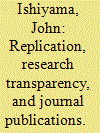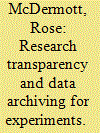|
|
|
Sort Order |
|
|
|
Items / Page
|
|
|
|
|
|
|
| Srl | Item |
| 1 |
ID:
149107


|
|
|
|
|
| Summary/Abstract |
Reproducibility is held to be the gold standard for scientific research. The credibility of published work depends on being able to replicate the results. However, there are few incentives to conduct replication studies in political science. Replications are difficult to conduct, time-consuming, and hard to publish because of a presumed lack of originality. This article sees a solution in a profound change in graduate teaching. Universities should introduce replications as class assignments in methods training or invest in new stand-alone replication workshops to establish a culture of replication and reproducibility. This article will first discuss the benefits of conducting replications. The main part will focus on concrete steps in integrating replication in the classroom, from selecting a paper to final manuscripts. Drawing on the author's own teaching experience as well as that of others, particular emphasis will be on the pitfalls and challenges of letting students replicate work, as well as potential criticism. Only if universities nurture a reproducibility and replication culture can we ensure that the gold standard of reliable, credible, and valid research is not just an empty phrase.
|
|
|
|
|
|
|
|
|
|
|
|
|
|
|
|
| 2 |
ID:
131529


|
|
|
|
|
| Publication |
2014.
|
| Summary/Abstract |
As an abstract idea, openness is difficult to oppose. Social scientists from every research tradition agree that scholars cannot just assert their conclusions, but must also share their evidentiary basis and explain how they were reached. Yet practice has not always followed this principle. Most forms of qualitative empirical inquiry have taken a minimalist approach to openness, providing only limited information about the research process, and little or no access to the data underpinning findings. What scholars do when conducting research, how they generate data, and how they make interpretations or draw inferences on the basis of those data, are rarely addressed at length in their published research. Even in book-length monographs which have an extended preface and footnotes, it can sometimes take considerable detective work to piece together a picture of how authors arrived at their conclusions.
|
|
|
|
|
|
|
|
|
|
|
|
|
|
|
|
| 3 |
ID:
131531


|
|
|
|
|
| Publication |
2014.
|
| Summary/Abstract |
The number of people conducting scientific analyses and the number of topics being studied are higher than ever. At the same time, there are questions about the public value of social scientific endeavors, particularly of federally funded quantitative research (Prewitt 2013). In this article, we contend that data access and research transparency are essential to the public value of the enterprise as a whole and to the credibility of the growing number of individuals who conduct such research (also see Esterling 2013).
|
|
|
|
|
|
|
|
|
|
|
|
|
|
|
|
| 4 |
ID:
131535


|
|
|
|
|
| Publication |
2014.
|
| Summary/Abstract |
Calls for greater data access and research transparency have emerged on many fronts within professional social science. For example, the American Political Science Association (APSA) recently adopted new guidelines for data access and research transparency. APSA has also appointed the Data Access and Research Transparency (DA-RT) ad hoc committee to continue exploring these issues. DA-RT sponsored this symposium. In addition, funding agencies like the National Institutes for Health (NIH) and the National Science Foundation (NSF) have expanded requirements for data management and data distribution. These pressures present challenges to researchers, but they also present opportunities.
|
|
|
|
|
|
|
|
|
|
|
|
|
|
|
|
| 5 |
ID:
149110


|
|
|
|
|
| Summary/Abstract |
What is the main motivation for replication in international relations? How can we implement it, and who is in charge? With a variety of proposals put forward by the contributors to this special issue, it seems useful to provide a synopsis. This article does so by asking a set of key questions related to replication, and by summarizing the stance each proposal takes with respect to these questions. This comparison reveals that there are fewer disagreements than we would think: there is broad consensus when it comes to the motivation and the need for replication in our field. However, proposals diverge as to how replication should be best implemented and, to a lesser extent, who should be the driving force behind this. This article concludes with a recommendation for a dual strategy. First, simple replication on the journal side should be implemented as a routine quality check to weed out work that does not even satisfy basic replication standards. Second, journals should be encouraged to allow publication of more comprehensive, in-depth replication studies with an independent contribution.
|
|
|
|
|
|
|
|
|
|
|
|
|
|
|
|
| 6 |
ID:
149103


|
|
|
|
|
| Summary/Abstract |
Replication is widely seen as an important way to promote transparency and quality control of published work in the social sciences. In international relations, the replication movement moved forward with a panel at the International Studies Association in 2002, subsequently published in this journal. The publication included a joint statement by four editors of leading quantitative journals in international relations, pledging their journals to a set of minimum replication standards and urging other editors to follow suit. Over the years, these and other journals have posted hundreds of data sets. Nevertheless, progress has been slow, and many journals still have no policy on replication or fail to follow up in practice. In this forum, we discuss how improvements can be made to current policies and practices and how replication can be used systematically in teaching international relations and extended to qualitative work.
|
|
|
|
|
|
|
|
|
|
|
|
|
|
|
|
| 7 |
ID:
131536


|
|
|
|
|
| Publication |
2014.
|
| Summary/Abstract |
Recently, the importance of research transparency via replication studies has been greatly discussed in most of the social sciences, political science included. Indeed, as Gherghina and Katsanidou (2013) and Freese (2007) note, to some extent, the discussion has been prompted by the tremendous changes in publishing in the past decade or so. With the enormous expansion in data availability and instant publication made possible by the Internet, there now are many opportunities to verify the findings presented in the discipline's major journals. "Replication, replication" has not only become the mantra for political science, but for economics, psychology, and quantitative sociology as well. These developments opened a debate on how to best "guard the high standards or research practice and allow for the maximum use of current knowledge for the further development of science" (Gherghina and Katsanidou 2013, 1; for similar sentiments see King 1995).
|
|
|
|
|
|
|
|
|
|
|
|
|
|
|
|
| 8 |
ID:
131533


|
|
|
|
|
| Publication |
2014.
|
| Summary/Abstract |
Although still more common in medical studies and some other areas of social science such as psychology and behavioral economics, experimental work has become an increasingly important methodology in political science. Experimental work differs from other kinds of research because it systematically administers a specific treatment to part of a population while withholding that manipulation from the rest of a subject pool. The best studies strive to keep all other aspects of the experiment similar, so that any emergent difference between the treatment and control group that emerge provide unparalleled traction in determining causal inference. Many other valuable forms of social research use observation of the natural world, rather than depending on intervention to advance understanding. Because experimentalists can create the environment or process they want to study, this strategy of intervention and manipulation constitutes the main distinction between experimental work and other forms of social observation.
|
|
|
|
|
|
|
|
|
|
|
|
|
|
|
|
|
|
|
|
|